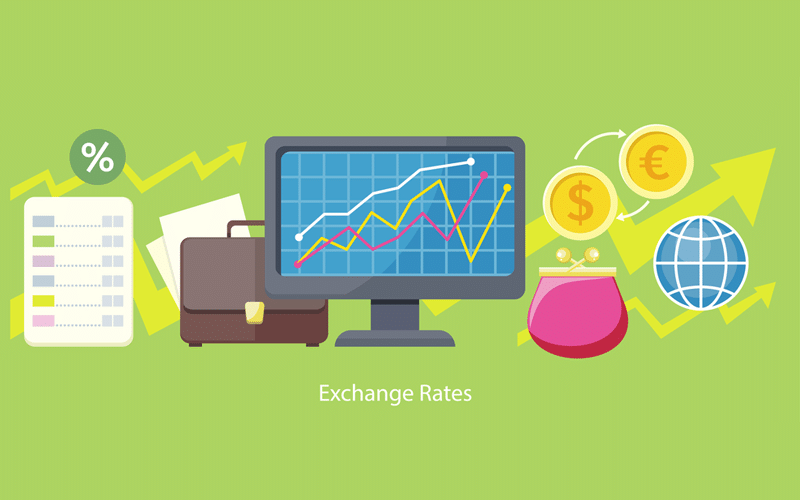The essence of forex trading is the movements of exchange rates between a pair of currencies. To be an efficient and successful forex trader, it is essential to understand its working mechanisms.
Knowing the different factors that affect exchange rates will help you make well-informed speculative decisions on your trades, whether it is to increase the size of your position or minimise losses when things are not going your way.
Exchange rate system
The relative value of a currency to another is dependent on its demand and supply. Another way to look at this is money in and money out of a specific country. When money comes into the country, it contributes to demand whereas money going out accounts for the supply.
Below are six factors that affect the supply and demand of a currency.
Volume of imported goods
When we want to buy an imported good, it must be noted that we are required to buy their currency therefore contributing to our supply of currency in the forex market and the demand for the other currency. In the case of an increase in the amount of imports, the supply of our currency is increased hence, it appreciates. The currency tends to depreciate if there is less reliance on imported goods and services.
As a result of this, countries that have a natural tendency towards consuming overseas products will have a lower exchange rate. If this country relies heavily on imported goods, we can expect the government and central bank to raise the relative value of their currency to make imports more affordable. Understanding this theory and the psychology of all stakeholders, traders can evaluate the risk and reward of their different approaches.
Volume of exports
Exports are the opposite of imports. When we export a good, the importing country will have to buy our currency which increases the demand for our currency.
A country that focuses on export will wish to have their currency relatively cheap compared to others to keep the price of their exports competitive in a foreign market. Therefore, it is reasonable to predict that the government will try to keep it as low as possible. A famous example of this is China’s low exchange rate.
Trading budget
Balance of trade is the ratio between exports and imports of a country. Not all countries will have a net zero value for the balance of trade. Some countries will focus more on exports and others will be more reliant on imported goods.
However, each government does have a target ratio that they want to meet. For exporting countries, the government does encourage some imported goods as a natural way to depreciate the currency and allow firms that focus on exports to focus on their specialised products to maximise the benefits of free trade. On the other hand, countries that normally import more goods will encourage some exports. This is done in order to appreciate the currency to make other imports cheaper and also protect domestic producers.
Hence, if there is an excess in one way or another, we could expect the government to adjust the exchange rates to encourage consumption patterns that will meet the targeted balance of trade.
Variation of interest rates
Apart from its function of influencing the rate of economic growth as a part of monetary policy, changes in interest rates will also affect exchange rates. Higher interest rates will appreciate the currency and vice-versa.
One contribution to the change in exchange rate is foreign investors. For example, foreign investors will be attracted by an increase in interest rates because there are better returns for their investment. If the bank in a foreign country offers better rates, they will transfer their savings over to maximise their returns. Money coming into the country will increase the demand of the currency which in turns appreciates it.
Not only that, the change in consuming habits of local citizens as a result of interest rate adjustments will also have an effect on exchange rates. A contractionary monetary policy tends to lean towards a higher level of savings. This will mean there are less imports consumed decreasing the downward pressure on the currency.
The opposite will happen when interest rates are low, the relative value of the currency will go down.
State of the current account
The current account is one of three elements that makes up the balance of payments which deals with a country’s imports, exports, payments to foreign investors and transfers. Although a negative current account is not detrimental to an economy, the government will try to keep it neutral, if not positive. Therefore, it is a good indication of what policy the government will decide to employ.
If they are in a deficit, they would like to export more goods, therefore will try to depreciate the currency to gain more exporting advantage. On the contrary, a current account surplus would likely result in the government relaxing regulations that aim to depreciate the currency.
Overall economic welfare
Understanding the overall economic health will help you realise investment trends. For example, a developing economy might receive an influx of foreign investments to take advantage of the high growth potential and cheaper labour. Such events will result in an increase in the currency’s exchange rate.
If a country has inflation, you can expect the government to increase interest rates to encourage savings. They will also rely on increasing exchange rates to decrease exporting volume.
Conclusion
Keeping a hand on the pulse of the interest rates, balance of trades, with specific imports and exporting tendencies, as well as the general economic health and the current account will be a big step towards success in forex trading.
However, it should be noted that all of these individual factors and the exchange rates will be affected by consumers’ speculations and confidence. Speculations are made all the time, and the sentiment of the forex market will have an influence on the exchange rate.
